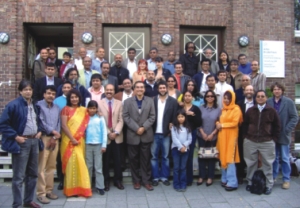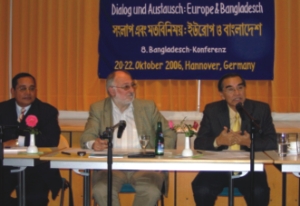|
International
Talking Bangladesh in Germany
Sharaf Ahmed
 |
Participants of the Bangladesh conference in Hanover. |
Contemporary international debates often focus on extending worldwide partnerships. An innovative dialogue known as the Bangladesh Conference has been taking place in Hanover, Germany since as early as 1994. This year the 8th Bangladesh Conference was held in Hanover, the capital of lower Saxony (Germany) from October 20 to October 22.
The main objective of the conference is to create a platform. Usually members of the Bangladeshi expatriate community in Germany as well as influential Germans from the German government and NGOs take part in this conference. This has strengthened the bilateral relationship between Bangladesh and Germany and has also helped to present a more positive image of Bangladesh in Europe.
This year's theme was 'Dialogue and Discussion: Europe and Bangladesh'. As the five year term of the BNP-led four party coalition government was coming to an end, the political situation naturally predominated the Conference. But the discussions also focused on economic exchange, scientific help and cultural communication. Under the present Bangladeshi context, one of the major topics of discussion was the pre-election situation of Bangladesh. The conference was attended by Mahfuz Anam, editor and publisher of The Daily Star and Prothom Alo who was the chief guest, Prof. Nisar Hossain from the Institute of Fine Arts, Dhaka University and singer Samina Chowdhury. Specialists on Bangladeshi issues from Germany and other parts of Europe also took part in the discussions.
Recently several delegations have visited Bangladesh and have expressed their concern for a fair and transparent election. The relevant issues include what the impact of irregularities in the preparation of the election is, the future of secularism in a religiously polarised region, the steps taken by European monitor-teams in Bangladesh and Europe, how civil society in Bangladesh and Europe can strengthen the preconditions for a real democratic development in a dialogue-process.
According to Mahfuz Anam although the people of Bangladesh have always fought for democracy, our political leadership has failed to nurture a democratic culture. People's cultural identity is deeply entrenched in the hope for democracy. In the context of the upcoming elections, the role of the caretaker government and its chief advisor the controversies surrounding the Election Commission were among the topics discussed. The session on the elections was chaired by Bernhard Hertlein from Amnesty International, Bangladesh co-group.
 |
Mahfuz Anam with Bernhard Hertlein and Dr. Ahmed Ziauddin |
In the wake of Prof. Yunus's recent winning of the Nobel Peace Prize there was an air of optimism at the conference venue. The workshop on 'Economic Exchange' was moderated by Sujit Chowdhury, a professor of Development Economics at Halle Martin Luther University. A student of the same university from the South Asia Studies department, Melanie Fuchs, Dr. Haider Mirza, an expatriate Bangladeshi engineer and Christine Hoberman, a specialist on social standards in the garments trade, also took part in this workshop. Melanie Fuchs related her experience of working for an IT firm in Bangladesh and encouraged other German students to go to Bangladesh. Haider Mirza talked about the current power crisis in Bangladesh and proposed ways Germany could assist Bangladesh in solving it.
Germany is Bangladesh's second biggest export market and German buyers are coming forward to talk about the social conditions of Bangladeshi garment workers. Christine Hoberman stated that this also requires further involvement. Everyone wants that Bangladesh's garments industry is further developed said Hoberman but it is important to acknowledge that there is a direct relationship between the development of the social condition of garments workers and overall economic development of the country.
In the Dialogue in Science workshop, some exciting ideas for exchange were discussed. This workshop was moderated by Dr. Chantu Saha- Moller, a Chemistry professor at the University of Wurzburg, where over 300 Bangladeshi students study or are doing research. Rumana Rana, a research student from Gottingen University talked about how she received the DAAD Scholarship. Aftab Sheikh, another research student from Hanover University talked about his experience as well. But the most noteworthy part of the workshop was the discussion on future exchanges between Bangladeshi and German universities. So far the only successful endeavour has been physicist Dr. Golam Abu Zakaria who had managed to broker an agreement of scientific cooperation between National Medical University and Heidelberg University. Already quite a large number of students have gone to Germany to study 'medical physics'. Medical physics, said Dr. Saha, is a new subject and should be looked into in the context of more exchange between Bangladeshi and German universities.
Bangladeshi artist Wakilur Rahman, a long-time resident of Berlin, moderated the Cultural workshop. The discussions focused on the opportunities for Bangladeshis to exhibit their work in Germany. Professor Nisar Hossain from the Institute of Fine Arts in Bangladesh said that as long as cultural exchange was confined to a one-way approach, the chances of international cultural exchanges would be slim and without such international cultural exchange, communications between Germany and Bangladesh would remain one-sided. German artist Mrs. Lepart who had spent some time in Bangladesh and was well acquainted with Bangladeshi artists said that there were innumerable opportunities for co-operation between the two countries, in this particular field.
 Shaheem Dill Riaz, a Bangladeshi film director based in Berlin showed his film, ' Shilposhohor Shopnolokh' and later Betina Mocher, a film critic, discussed the film. Shaheem Dill Riaz, a Bangladeshi film director based in Berlin showed his film, ' Shilposhohor Shopnolokh' and later Betina Mocher, a film critic, discussed the film.
Apart from the dialogues and workshops there were photo exhibitions and cultural shows. Samina Chowdhury, a well known singer and Debarati Guha performed at the cultural show. Al Amin, a Bangladeshi pop singer based in Sweden also performed with a background footage of a video on Bangladesh. Professor Abdullah Al Farukh, the head of the Bangla Department of Duetsche Welle University, recited a poem written by the late Shamsur Rahman as a tribute to the poet. Lipi Ahmed directed the cultural programme.
Experts and human rights activists from Holland, UK, Sweden and Belgium, attended the Conference. Many expatriate Bangladeshis enthusiastically participated in the conference.
The working group “Bangladesh in Lower Saxony” (AK BiN) organises the conference together with the Stephansstift Hanover, Centre for Adult Education, as partner and venue. There is support from Lower Saxony, Germany, Europe, Bangladesh and Southasia.
The conference is supported by the Lower Saxony Lottery / BINGO!, the Ministry for Science and Culture in Lower Saxony / University of Hanover, EED, DSE, Foundation Umverteilen.
The cultural project gets support by the City of Hanover, One World Fund / Catholic Church and others.
Copyright (R) thedailystar.net 2006 |
